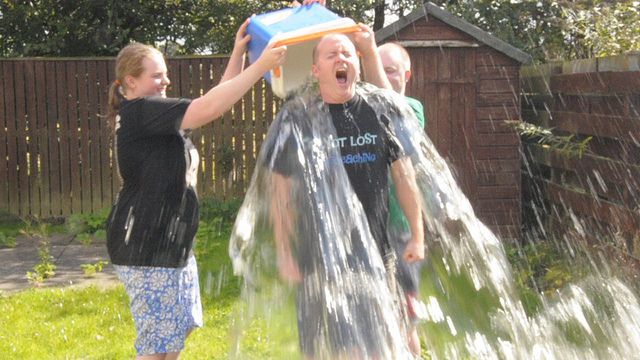"Ice bucket challenge – is it really that 'awesome'?"
September 8th, 2014 Videos of people taking the ice bucket challenge are everywhere on social media, but Madusha Erandi, 21, a Commonwealth Correspondent from Sri Lanka, asks whether other causes aren’t equally deserving of the awareness and money being raised.
Videos of people taking the ice bucket challenge are everywhere on social media, but Madusha Erandi, 21, a Commonwealth Correspondent from Sri Lanka, asks whether other causes aren’t equally deserving of the awareness and money being raised.
As all of us know by now that the Ice Bucket challenge has been viral on social media and has been spreading throughout almost all societal sectors. Famous politicians, CEOs, film stars and other celebrities are engaged in this, intending to raise awareness about the disease Amyotrophic Lateral Sclerosis (ALS).
Simply this is done by dumping a bucket of ice water on one’s head. Within 24 hours of being challenged participants have to record a video of themselves accepting the challenge by putting ice into a bucket of water. Then the bucket is lifted and poured over the participant’s head. Afterwards the participant can all out a challenge to other people as well.
According to Wikipedia, whether people choose to donate, perform the challenge, or do both varies. In one version of the challenge, the participant is expected to donate $10 if they have poured the ice water over their head or donate $100 if they have not. In another version, dumping the ice water over the participant’s head is done in lieu of any donation.
It is important to be aware of ALS, the disease for which the ice bucket challenge was created. Amyotrophic lateral sclerosis is a motor neuron disorder – a progressive neurodegenerative disease that affects nerve cells in the brain and the spinal cord. Motor neurons reach from the brain to the spinal cord, and from there to muscles throughout the body. The progressive degeneration of the motor neurons in ALS eventually leads to their death. When the motor neurons die, the ability of the brain to initiate and control muscle movement is lost. With voluntary muscle action progressively affected, patients in the later stages of the disease may become totally paralyzed.
However, despite the fact that this seems to be an interesting challenge there have been questions raised. US diplomats have been banned from engaging in the ice bucket challenge because of ethical rules preventing the use of public office holders for private gain, even in a worthy cause.
The ice bucket challenge arrived late in Sri Lanka. Nevertheless, many of the Sri Lankan celebrities like beauty queens, cricketers, politicians and musicians engaged in the ice bucket challenge. Legends in Sri Lanka cricket, Mahela Jayawardana and Kumar Sangakkara, challenged many other international cricketers on this venture.
The event which catches the most interest in the Sri Lankan context is that a young and new female politician has invited the president to take the ice bucket challenge. There is a question to what extent this would follow the ethics and rules in several professions.
As a result of the ice bucket challenge the ALS association, which raised $64 million in 2013, raised more than $10 million on Thursday, August 21, 2014 alone.
Apart from all interesting fun, and attractive funds, one should bear in mind the dark side of this challenge. There is a question whether funds which were been donated to the ALS foundation actually go for the welfare of ALS patients and for awareness programs. There are scammers who try to make black money out of those funds. Many public characters have criticized the challenge a fun game rather than a charitable event. Some see it as a middle-class wet-T-shirt contest for armchair clicktivists.
Wikipedia reports that Pamela Anderson refused to take part because ALS uses animal experimentation. Moreover, if this kind of enthusiasm exists to increase awareness of a disease, why wouldn’t people make games and challenges to eradicate poverty in the world? Funding for sustainable development or empowering education can also be options for fun-raising events through entertainment methodologies. People are deadly afraid of E-bola – why would anyone talk of raising awareness in those rather than confining it to the scientists?
Charity is not only one particular event. Just because every idiot in the world is jumping off of a cliff doesn’t mean you should too. It’s not that raising awareness in ALS is a bad idea, but of course there are many more aspects in life that need attention to bring about a society that is balanced.
photo credit: Gordon McKinlay via photopin cc
………………………………………………………………………………………………………………
About me: I am determined and ambitious; ready to take up any challenge. A former journalist, I’m studying law at University of Colombo and doing freelance writing. I believe the youth is the fruitful future of any country and the positive anticipation of the developing world.
I love observing people, their nature and writing about them. I am a wannabe photographer. I swim, do athletics, and sing. I consider myself as a genuine social worker. Writing is simply my passion.
………………………………………………………………………………………………………………
Opinions expressed in this article are those of the author and do not necessarily represent the views of the Commonwealth Youth Programme. Articles are published in a spirit of dialogue, respect and understanding. If you disagree, why not submit a response?
To learn more about becoming a Commonwealth Correspondent please visit:
http://www.yourcommonwealth.org/submit-articles/commonwealthcorrespondents/
………………………………………………………………………………………………………………




